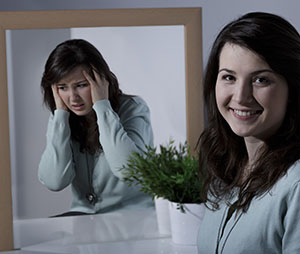Prevailing Over Bipolar Disorder. I’d like to help you overcome Bipolar Disorder. Call 215-322-6781 for a no obligation consultation to see if my services are right for you.
Over 30 years’ experience

Untreated Bipolar Disorder can undermine your functioning at work, family and social gatherings, as well as increase your risk for substance abuse, financial problems and even suicide. You can have a full and satisfying life by treating Bipolar Disorder (BD) with counseling, medication, exercise, and good nutrition. BD affects 1 in a 100 people, often runs in families, and affects men and women equally. Many with Bipolar Disorder are bright, talented and creative. People are often diagnosed with BD, between ages 15 to 30 years, following a stressful or traumatic event in their lives such as starting a new job, losing a job, going to college, family disagreements, marriage, death in the family or during seasonal changes and holidays.
Bipolar disorder has severe mood swings that may last for weeks or months: that can transition into periods of depression alternating with mania or intervals of normal mood.
Manic Phase: Extreme optimism, feeling unstoppable, very powerful and important, inflated self-esteem, irrational poor judgment, rapid speech and pressure to keep talking, racing thoughts, angry and aggressive behavior, restlessness, irritability, agitation, anxiety, increased physical activity, risky behavior (such as, abuse of drugs, particularly cocaine, alcohol, and sleeping medications, out-of-control spending sprees), increased sexual activity, needing little sleep, distractibility, trouble concentrating and denial that anything is wrong. Extreme manic episodes can sometimes lead to psychotic symptoms such as grandiose delusions and hallucinations. A mild to moderate level of mania is called hypomania. Hypomania may feel good; however, hypomania can become severe mania in some people or can switch into depression. Traumatic, abusive experiences in childhood, lack of sleep increases the risk of having an episode of mania.
ADHD and bipolar disorder both cause inattention and distractibility. The primary distinction between bipolar disorder and ADHD is the presence of a manic or hypomanic episode (see explanation above), which occurs with bipolar disorder but not those with ADHD. Bipolar Disorder is often confused with depression and ADHD. When this happens and the wrong medications are prescribed significant problems can arise. The proper diagnosis can take time and accuracy is substantially improved by including input from close relatives or spouse. Family members often feel helpless when a loved one is depressed or manic.
Depression Phase: Pervasive sadness and crying spells, lack of motivation, hopelessness, feeling empty, suicidal thoughts or attempts, anxiety, guilt, anger, feeling tired all the time, sleeping too much or inability to sleep, appetite problems (weight loss or gain), headaches, backaches or digestive problems, fatigue, isolation, loss of interest in activities formally enjoyed including sex, problems concentrating, drop in grades, trouble recalling things, irritability, restlessness, chronic pain without a known cause, self-loathing, guilt, worthlessness, apathy. In severe cases, the individual may become psychotic, a condition also known as severe bipolar depression with psychotic features. A depressive episode is diagnosed if five or more of these symptoms last most of the day, nearly every day, for a period of 2 weeks or longer. Depression and mania may rapidly alternate (rapid cycling) or be a condition where mania and clinical depression occur simultaneously (mixed state)-feeling very sad or hopeless and extremely energized. During a mixed state, symptoms often include agitation, trouble sleeping, major changes in appetite, and suicidal thinking. People in a mixed state simultaneously feel sad /hopeless and extremely energized. Alcohol or substance abuse can significantly worsen and trigger bipolar symptoms.
Treatment: Bipolar Disorder requires psychotherapy and medication for preventing relapse and reducing symptom severity. Like diabetes or heart disease, bipolar disorder is a long-term illness that must be carefully managed throughout a person’s life; otherwise, there is a risk of minor episodes turning into full blown mania or depression. Even small changes in one’s energy, mood, sleep and eating behaviors are important because they may signal the beginning of a mood swing that must be promptly addressed. Some people find that keeping a log of their moods can assist them in predicting changes. If your loved one has bipolar disorder, you may want to get counseling for yourself. Therapy can also help a child who has a bipolar parent.
Psychotherapy can help you: Understand your illness, define and reach wellness goals, overcome fears or insecurities, cope with stress, make sense of past traumatic experiences,separate your true personality from the mood swings caused by your illness, identify triggers that may worsen your symptoms, improve relationships with family and friends, establish a stable, dependable routine, develop a plan for coping with crises, understand why things bother you and what you can do about them and end destructive habits such as drinking, using drugs, overspending .
Cognitive-Behavioral Therapy (CBT): identifies unhealthy, negative beliefs and behaviors and replaces them with healthy, positive ones. One aspect of CBT helps a person recognize the automatic thoughts or core beliefs that contribute to negative emotions.
Family Therapy: Because the symptoms of bipolar disorder can be quite severe and can have a major effect on people whom the person is close to, family therapy can be extremely helpful in the management of the condition. The primary goal of family therapy for Bipolar Disorder is to teach the family, including the client, information, and skills necessary to effectively manage this condition. Families can play a critical role in helping to monitor the symptoms of bipolar disorder and prevent relapses.
Medications: Most experts now generally agree that patients with bipolar disease need a mood stabilizing drug to keep them from cycling between depression and mania. Several different medications may need to be tried before the best course of treatment is found. There have been however many cases in my practice where holistic approaches on their own have worked quite well in controlling bipolar symptoms. The problem with medication in treating bipolar is that patient compliance is often low. So, having effective alternatives available is extremely valuable.